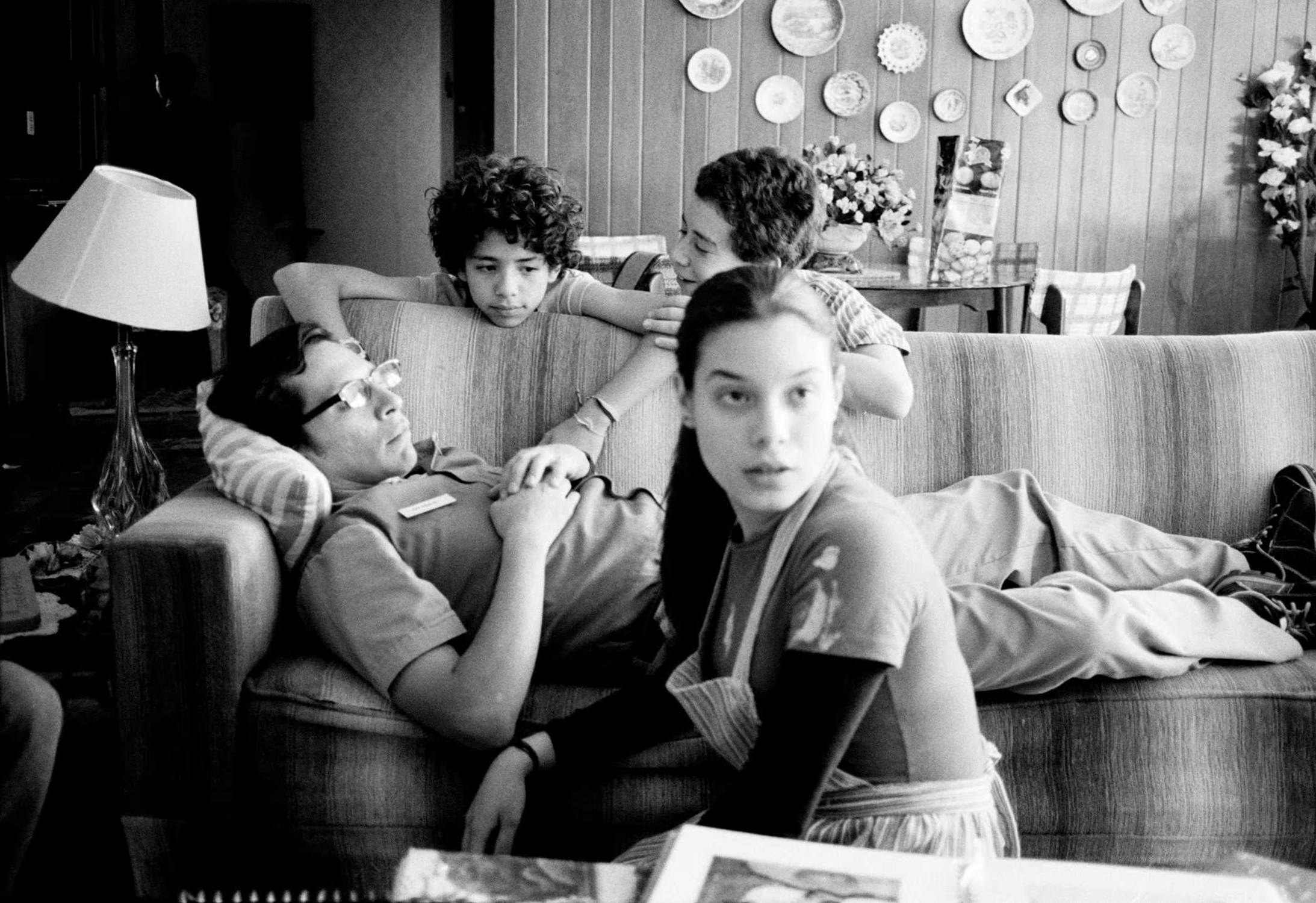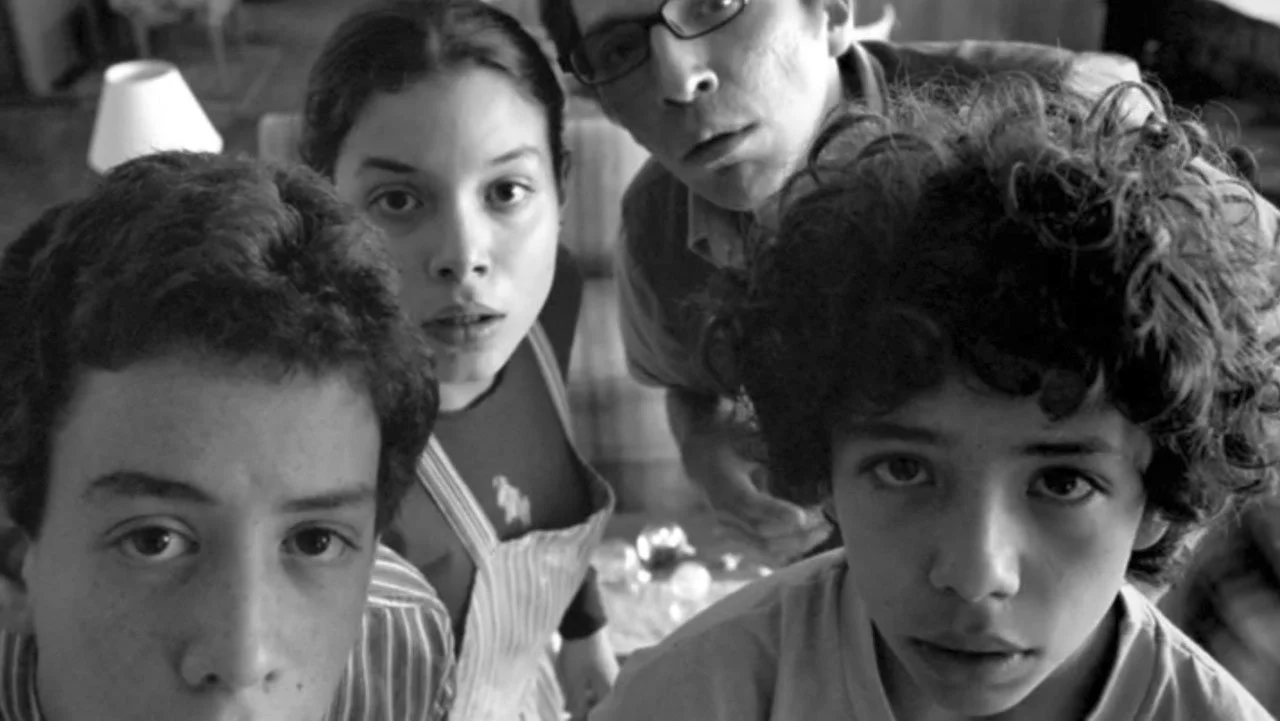By Natalia Hernández Moreno
Guadalajara, March 2004. A crowd of cinephiles was delighted for the first time with a monochrome exploration of a seemingly uneventful Sunday. A rich meditation on boredom and childhood curiosity, Fernando Eimbcke’s cherished debut feature Duck Season / Temporada de patos creates a timeless portrait of friendship, enduring loneliness, and despair. Twenty-one years after its world premiere at the Guadalajara Film Festival—where it swept eight awards including Best Mexican Film and Best Director—and its international premiere at Cannes’ Critics' Week sidebar, Duck Season continues to resonate as a poignant turning point in Mexican and Latin American cinema.
Co-written by Eimbcke and Mexican-Argentine filmmaker Paula Markovitch (The Prize), the story follows fourteen-year-olds Flama and Mako, friends since childhood. Left alone by their parents, they gather everything they need to survive yet another boring Sunday at the Tlatelolco housing complex: video games, pizza, comics. Their plans are interrupted by their beautiful teenage neighbor Rita and pizza delivery man Ulises, who are also seeking antidotes to tedium.
Given the film’s poignant focus on adolescent perception and naïveté, Eimbcke cast actors without extensive on-camera experience for the roles of Rita (Danny Perea), Mako (Diego Cataño), and Flama (Daniel Miranda). “I was looking for fresh faces, kids who weren’t rigged in the medium by knowing their best camera angles or how to create sentimental situations by just showing a trembling tear,” the director explains. “I think the result was much better because we created reactions that deal more with reality than with the typical ways of showing teenagers.”
Aiming to make a film about teenagers out of respect for their constant need to search, their rejection of formulas and the established, and their energetic, carefree attitude, Eimbcke and his crew approached the young actors through genuine interest in their tastes in music, movies, videos, and books, investigating how they integrate these influences into their daily lives.
Shot in luminous black and white by cinematographer Alexis Zabé—also making his feature debut—Duck Season is visually attuned to crafting what feels like a fifth character: Tlatelolco. One of the most symbolically charged sites in Mexican history, Tlatelolco was the scene of the 1968 student massacre, where government forces killed hundreds of protesters just ten days before the Olympic Games. In the film, the neighborhood becomes a textured backdrop for a story of transition from childhood to adolescence. Director Fernando Eimbcke said he wanted to anchor Tlatelolco’s cultural significance within the imagination of younger audiences “so that they could see it and wonder what happened there.”
Zabé, who played a key role in location scouting and insisted on setting the film in Tlatelolco, saw the area as essential to the country’s cultural memory. He went on to build a remarkable international career, photographing Silent Light and Post Tenebras Lux for Carlos Reygadas, as well as The Florida Project for Sean Baker.
Script-wise, the structure is remarkable in its rhythm and drama, generating a dynamic among the four characters that intensifies around their constant need to search, play, and fill their time with metaphors and symbolism related to ducks. In Mexican slang, “becoming a duck” (“hacerse pato”) means to pretend, especially to feign ignorance or avoid a situation. It can imply acting clumsy, ignorant, or distracted. It can also refer to a surfer passing under a wave instead of paddling out to ride it.
Similarly, “the duck shooting at the shotguns” (“los patos disparándole a las escopetas”) represents the questioning made by the characters toward the authority figures in their lives (parents and bosses, in the case of delivery man Ulises). Closer to the end, the expression “to round off the circle” (“para redondear el círculo”) refers to the painting hanging in the living room, which shows ducks flying over a lake—finally embracing their flight.
Duck Season brought north the minimalist sensibility and deadpan humor that had begun to define a wave of South American cinema in the late ’90s and early ’00s—an aesthetic influenced by Jim Jarmusch and Aki Kaurismäki, and echoed in Martín Rejtman’s Silvia Prieto (1999), Diego Lerman’s So Suddenly / Tan de repente (2002), and Pablo Stoll and Juan Pablo Rebella’s 25 Watts (2001).
Yet Eimbcke’s film marked a singular turn in Mexican cinema: it infused that aesthetic with a distinctively local perspective, offering a quiet but radical focus on the quotidian lives of Mexico’s middle class. Eschewing grand narratives of aspiration or class struggle, Duck Season unapologetically reivindicated a space that had long been underrepresented on screen—one of stillness, routine, and understated emotional depth.
The film was a major critical success in Mexico, resonating with both audiences and critics for its understated humor and emotional depth. At the Ariel Awards—the country’s equivalent of the Oscars—Duck Season won 11 prizes, including Best Film, Best First Feature, and Best Director for Eimbcke. The film’s recognition across categories reflected the strength of its ensemble cast, sharp screenplay, and distinctive visual style. Its sweeping success marked the arrival of a new voice in Mexican cinema and signaled a shift toward more intimate, character-driven storytelling in the national film landscape.
Eimbcke, who studied film directing at the Centro Universitario de Estudios Cinematográficos (CUEC), went on to direct Lake Tahoe (2008) and Club Sandwich (2013), as well as segments for the omnibus films Revolución (2010), Ayotzinapa 26 (2016), and Berlin, I Love You (2019). After a long hiatus, he directed the coming-of-age movie Olmo—shot in New Mexico and produced by Michel Franco and executive produced by Brad Pitt—which premiered this past February at the Berlin Film Festival.
Duck Season, which features a Spanish-language cover of the Brazilian bossa nova classic “O Pato” by João Gilberto—sung by Natalia Lafourcade—was also nominated for Best Foreign Film at the Independent Spirit Awards in the United States. It was released theatrically in the U.S. in March 2006 by the now-defunct Warner Independent Pictures, a subsidiary of Warner Bros. The release was championed by director Alfonso Cuarón and his production company, Esperanto Filmoj. “I fell in love with it immediately,” Cuarón said of Eimbcke’s film. “I was so envious and jealous. I thought, this was the kind of movie I should have done. But thank God admiration took over and jealousy went away.”
Duck Season offers a timeless portrait of friendship, loneliness, and the small ruptures that shape us. With a budget that fits the director's ingenuity and creativity, four characters, one location, a monochrome palette, and a shrewd script, Eimbcke’s debut remains a contemporary Latin American classic—proving that what is needed in filmmaking is the daring to explore the conflicting contrast between the need to emigrate in search of new waters and the fascinating contemplation of everyday life through adolescent awe and rage.
To commemorate Duck Season’s 20th anniversary, Cinema Tropical has partnered with the Brooklyn Academy of Music (BAM) for a special screening this Thursday, May 22, in New York City. For tickets and more information visit https://www.bam.org/film/2025/duck-season.







